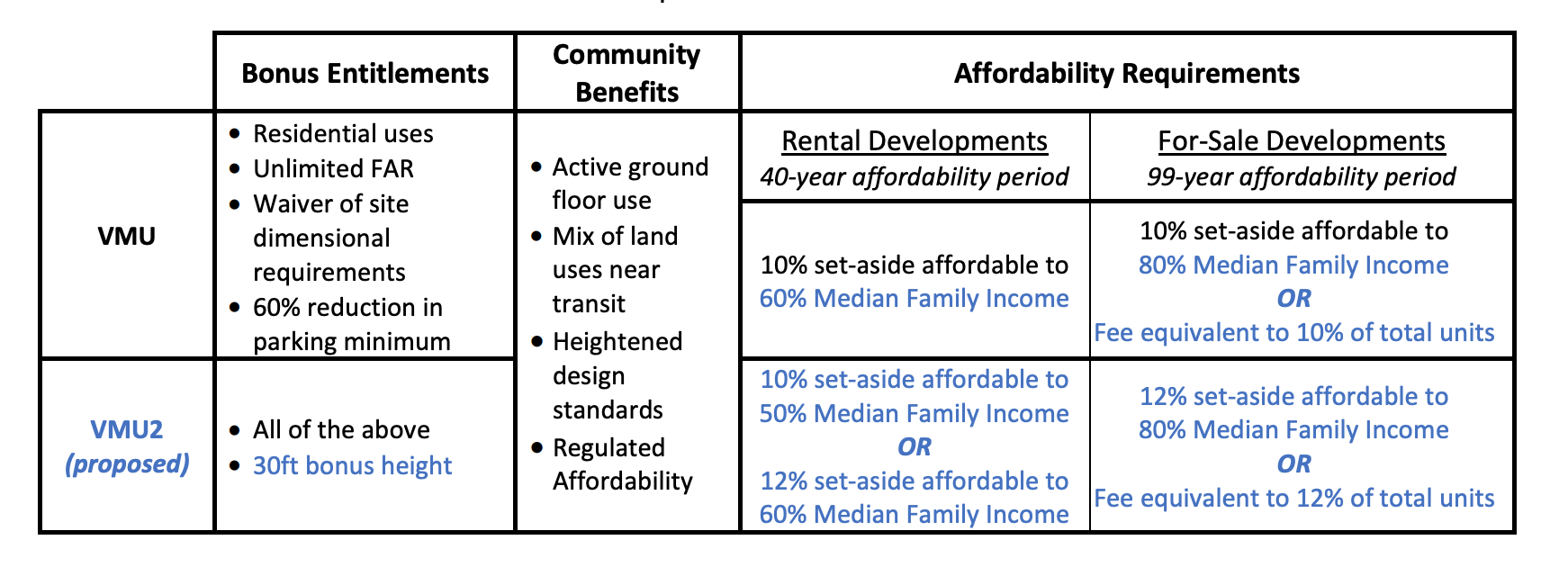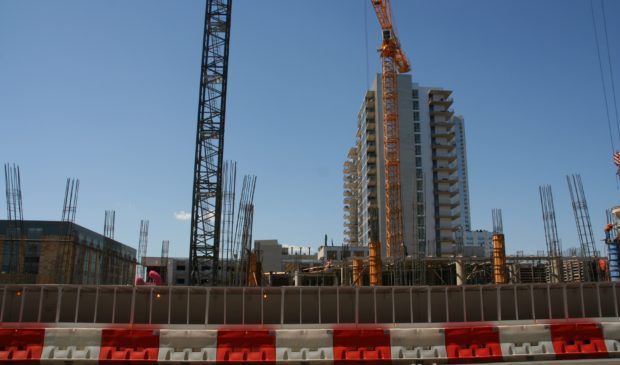Proposed VMU changes stir compatibility controversy
Friday, March 25, 2022 by
Jonathan Lee The Planning Commission has recommended changes to the Vertical Mixed-Use density bonus program to let developers build taller in exchange for more affordable housing – but only after animated discussion about compatibility standards.
The proposed change, if passed into ordinance by City Council, would create two tiers of VMU: VMU1 and 2. VMU1 would keep the current 60-foot height limit while slightly increasing affordability requirements, while VMU2 would allow developers to build up to 90 feet in exchange for even more affordable housing.
Council voted 9-0 in November to initiate the code changes as a way to increase the supply of both market-rate and income-restricted housing as the city reels from rising housing costs. The city considers VMU among its most successful affordable housing programs, having created 540 affordable units since its inception in the late aughts plus another 900 units planned or under construction.
City staffers summarize the updates to the program in the table below:

The commission’s hearing Tuesday proved drawn-out and contentious. While commissioners mostly agreed on the code change, they sparred over whether to suggest Council discuss other topics – some controversial – that affect the VMU program. These considerations, proposed by a Planning Commission working group, include:
- Constraints on VMU lots due to compatibility (a rule that limits the height of buildings within 540 feet of single-family homes)
- Distribution of VMU zones across the city, including the program’s feasibility in wealthier areas and its relationship to gentrification and displacement in poorer areas
- Whether to further reduce or eliminate parking requirements in VMU zones
- Calibration of the program to market conditions
Commissioners also differed on whether to agree to a six-week postponement demanded by neighborhood groups, voting narrowly against further delaying a hearing that Council said was supposed to happen by the end of January.
Over a dozen community members, most of whom are involved in neighborhood groups, spoke Tuesday against the changes. While many were wary of the complications of allowing more height near single-family homes, the mention of changing compatibility caused the most stir.
“The compatibility standards are what keeps Austin from being Houston,” neighborhood activist Daniel Llanes said. “They need to stay in place.”
Compatibility standards prevent most VMU lots from reaching the maximum height allowed in VMU zones, as this chart from Housing and Planning shows:

Staffers also prepared an interactive map to show how compatibility affects each VMU lot.
Michael Whellan, a land use attorney who spoke on his own behalf, argued for limiting compatibility to 100 feet instead of 540 feet so that more VMU lots could reach their maximum height, thereby allowing more affordable and market-rate housing. “We say we want to leverage our corridors for growth and affordability, but we’re not actually designing land use policies that allow that,” Whellan said.
While some think compatibility hurts housing affordability, Commissioner Solveij Rosa Praxis argued that in some cases, the opposite might be true. She said by preventing redevelopment of some lots in poorer neighborhoods or otherwise keeping property taxes relatively low, compatibility might actually mitigate gentrification and displacement.
The hearing was most heated when some commissioners opposed recommending that Council talk about compatibility – or any of the working group’s suggestions at all.
“You can’t address compatibility citywide in one piece of a proposal,” Commissioner Carmen Llanes Pulido said. “This has tremendous community planning implications.” Llanes Pulido had advocated for a postponement to allow community members more time to consider the changes. “We should always write the first draft – we being the public co-creating this,” she said.
Commissioner Awais Azhar said he felt “demoralized” by commissioners’ opposition to the working group’s efforts.
“Never before have I seen the entire recommendations of a working group so unceremoniously thrown out,” Azhar said. “Frankly, it is kind of insulting to me – the months of work that me and others have put into this just to be told by some saying that these are too broad, these are too specific, some saying they need more detail.”
Azhar suggested other commissioners were trying to evade discussions of compatibility and other controversial topics.
“I don’t think anyone here has disagreed with discussing the issues at hand,” Llanes Pulido responded, adding: “What we disagreed on here was process.”
After a period of complex motion-making, the commission ultimately voted 8-1-2 in favor of the code changes and suggestions to City Council.
Council is expected to discuss the changes April 7.
Photo made available through a Creative Commons license.
The Austin Monitor’s work is made possible by donations from the community. Though our reporting covers donors from time to time, we are careful to keep business and editorial efforts separate while maintaining transparency. A complete list of donors is available here, and our code of ethics is explained here.
You're a community leader
And we’re honored you look to us for serious, in-depth news. You know a strong community needs local and dedicated watchdog reporting. We’re here for you and that won’t change. Now will you take the powerful next step and support our nonprofit news organization?






